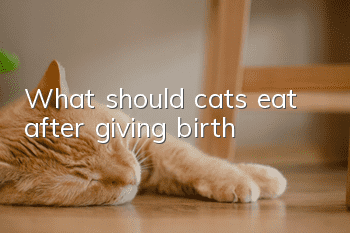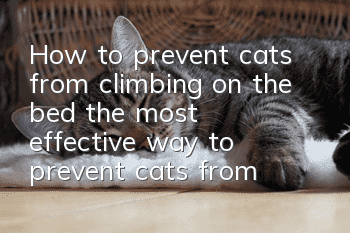What should cats eat after giving birth?

Notes on the cat’s postpartum diet:
1. After the cat has given birth successfully, it is not suitable to give it food immediately. Cat food and canned cat food cannot be given immediately. It eats. The owner can prepare some delicious chicken soup and soup in advance to feed the cat and replenish energy. Start trying to give her something to eat after the second day of delivery.
2. Lecithin is very effective for cats’ postpartum care. It is also called lecithin and is known as the “third nutrient” alongside protein and vitamins. It is recommended that cat owners take cat-specific lecithin to their cats, not only for their postpartum care, but also to increase their fur.
3. Calcium powder, shrimp shell powder, vitamin E, vitamin D and other nutrients can be added to the cat’s food to supplement the calcium in the cat’s body to ensure the healthy growth of the mother cat and her baby cats. .
4. In addition to dietary nutrition, nutritional paste also needs to be eaten. Because cats have greater nutritional needs after childbirth, it is difficult to provide a large amount of nutrients simply by dietary supplements. At this time, nutritional supplements are needed. Cream, the recommended one is nutritional cream, which basically meets the nutritional requirements and can quickly and efficiently provide nutrition to the mother cat.
5. Supplement protein. Cats can be supplemented with protein through meat, such as boiled chicken breast, steamed fish, eggs, canned meat, etc. You can also eat the liver of some animals, but don’t eat too much liver because it contains more toxins and can cause gastrointestinal problems for cats. Chicken is rich in protein, and chicken is relatively safe and unlikely to cause gastrointestinal allergies in cats. You can also stir cooked egg yolks into food.
Precautions for postpartum care of cats:
1. Female cats are prone to hypocalcemia 3 to 17 days after giving birth, which manifests as cramps, vomiting, If the cat is constantly panting, etc., you can supplement calcium by feeding the cat goat milk.
2. For the health of the mother cat and the smooth growth of the kittens, try to keep the environment around the delivery room as quiet as possible to avoid noise irritating the mother cat and kittens. Help the mother cat clean her vulva regularly to reduce the discomfort of lochia. .
3. Pay attention to whether the female cat has any postpartum diseases, such as abnormal postpartum bleeding, pus discharge from the vulva, mastitis, etc.
- Why do cats need to sharpen their claws?
- How to clean cat eye poop?
- How to clean a kitten that is too dirty to bathe
- What should I do if my female cat has a lump in her breast?
- Are Somali cats clingy?
- Why do cats curl up in balls when sleeping?
- Ragdoll Cat Personality Cat fairies don’t come for nothing!
- What is the best thing for a cat to eat after giving birth? What is the best thing for a female cat to eat after giving birth?
- What to do if a Canadian hairless cat has a difficult birth
- Can cats drink coconut milk?



